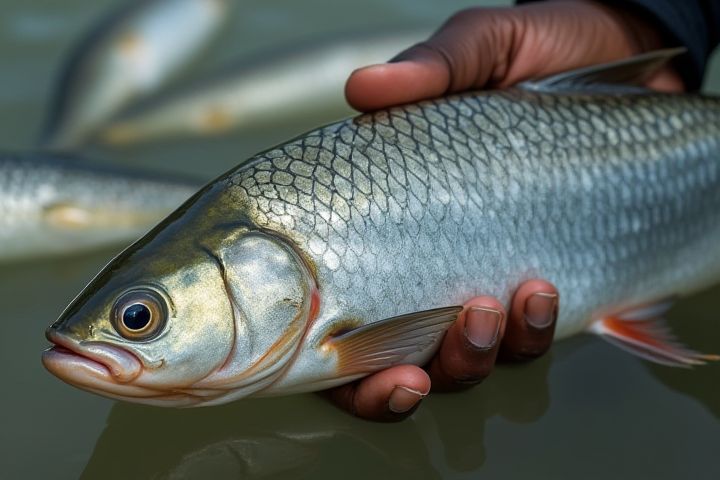
Fish farming in Nigeria has emerged as a vital component of the country's agricultural sector, significantly contributing to food security and economic development. With an extensive coastline and numerous inland water bodies, Nigeria has abundant resources for aquaculture, enabling the cultivation of species such as catfish and tilapia. The demand for fish is rising due to population growth and urbanization, making aquaculture an attractive business opportunity for investors. To enhance production, many fish farmers adopt modern techniques such as recirculating aquaculture systems and integrated farming practices. By focusing on sustainable practices, you can improve your fish farming venture while promoting environmental conservation and resource management.
Water quality management
Water quality management is crucial in fish farming in Nigeria, as it directly impacts fish health and productivity. Key parameters such as pH levels, dissolved oxygen, and ammonia concentrations must be routinely monitored to ensure optimal living conditions for aquatic species. The use of effective filtration systems and aeration techniques can significantly improve water quality, promoting better growth rates and reducing disease outbreaks. Implementing regular water testing and maintenance practices allows fish farmers to create a sustainable and profitable aquaculture environment.
Suitable species selection
Fish farming in Nigeria emphasizes the selection of suitable species such as catfish, tilapia, and trout, which thrive in the region's climate and water conditions. Catfish, particularly Clarias gariepinus, is favored for its fast growth, high market demand, and adaptability to local farming practices. Tilapia, known for its disease resistance and ability to reproduce quickly, offers an alternative for aquaculture diversification. By prioritizing these species, farmers can enhance productivity, ensure sustainability, and meet the growing demand for fish protein in Nigerian diets.
Pond construction
Pond construction is a critical aspect of fish farming in Nigeria, significantly influencing the productivity and sustainability of aquaculture ventures. Properly designed ponds provide essential habitat for various fish species, including catfish and tilapia, promoting optimal growth conditions. Aquaculturists must consider factors such as water quality, depth, and sunlight exposure when constructing these ponds to ensure efficient fish health and reproduction. You can enhance your fish farming success by implementing modern techniques in pond management and maintenance, maximizing yield while minimizing environmental impact.
Feed formulation
Fish farming in Nigeria emphasizes the importance of feed formulation to enhance growth and overall fish health. Properly balanced feed formulations provide essential nutrients, such as proteins, fats, vitamins, and minerals, which are crucial for the efficient growth of species like tilapia and catfish. Local ingredients, such as soybeans, maize, and fish meal, are often utilized to create cost-effective and high-quality feeds tailored to specific fish species. By investing in effective feed formulations, you can significantly improve your fish yield and contribute to the sustainability of aquaculture practices in Nigeria.
Disease control
In Nigeria, fish farming emphasizes effective disease control measures to ensure the health and productivity of aquaculture systems. Farmers implement biosecurity protocols, such as water quality monitoring and vaccination, to mitigate the risk of common ailments like catfish disease and bacterial infections. Regular health assessments of fish stocks help identify early signs of illness, allowing for prompt interventions and treatments. By prioritizing disease management strategies, Nigerian fish farmers can enhance yield, reduce economic losses, and promote sustainable practices within the aquaculture industry.
Market demand and trends
Fish farming in Nigeria has seen significant growth due to increasing market demand for protein-rich foods, with fish being a staple in the Nigerian diet. The aquaculture sector is responding to trends such as sustainable farming practices, which emphasize environmentally friendly techniques and resource efficiency. You can capitalize on the rising consumer preference for locally sourced and fresh fish, creating opportunities for small and large-scale farmers alike. The introduction of innovative breeding programs and improved feed formulations also contributes to higher yields and better fish health, ensuring profitability in this thriving industry.
Regulatory compliance
Fish farming in Nigeria emphasizes strict regulatory compliance to ensure sustainable aquaculture practices and protect the environment. Adhering to guidelines set by the National Programme for Food Security (NPFS) and the Federal Ministry of Agriculture promotes fish health, biosecurity, and consumer safety. Additionally, compliance with local laws facilitates access to government support and funding, enabling farmers to scale their operations effectively. By prioritizing regulatory adherence, you contribute to the overall growth and credibility of the aquaculture industry in Nigeria.
Sustainable practices
Fish farming in Nigeria emphasizes sustainable aquaculture practices to enhance productivity while safeguarding the environment. Techniques such as integrated multi-trophic aquaculture (IMTA) are employed, which promote nutrient recycling and minimize waste. Local fish species like catfish and tilapia are cultivated to reduce reliance on imported species, contributing to food security and economic resilience. By prioritizing eco-friendly systems, fish farmers aim to create a balanced ecosystem that benefits both consumers and local communities.
Financial planning
Fish farming in Nigeria emphasizes robust financial planning to ensure sustainability and profitability within the aquaculture sector. Effective budgeting allows farmers to allocate resources for feed, equipment, and labor, enhancing overall operational efficiency. Accessing loans and investment opportunities can further empower fish farmers to expand their operations and improve production techniques. Additionally, understanding market trends in fish demand helps in setting competitive prices and maximizing returns on investment.
Climate and environmental factors
Fish farming in Nigeria is significantly influenced by climate and environmental factors, including water temperature, pH levels, and rainfall patterns. Sustainable farming practices are crucial to maintaining freshwater sources and ensuring the health of fish stocks, as these elements directly affect fish growth and reproduction. Climate change poses risks, such as altered seasonal variations and increased flooding, impacting aquaculture productivity. Implementing effective management strategies can help mitigate these challenges, enabling you to optimize fish farming yields while promoting environmental conservation.
